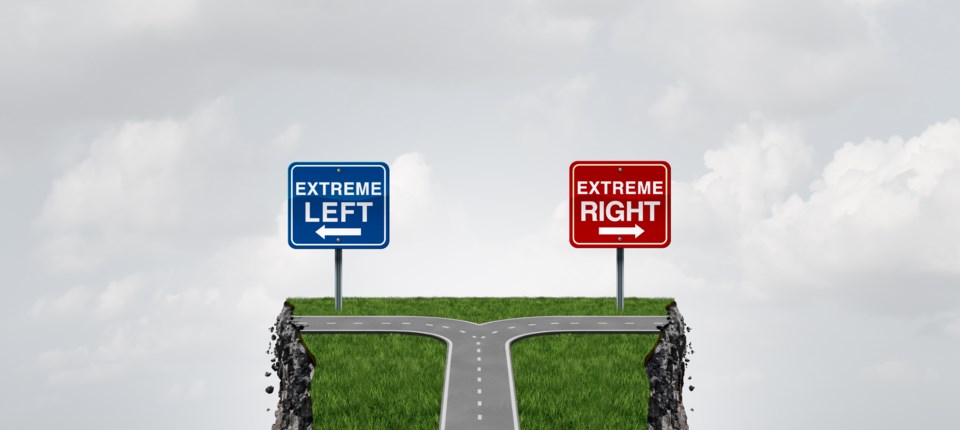In February 2021, the Canadian government designated the far-right group, the Proud Boys, as a terrorist entity.
At the time, it was argued that the designation was an important step in clearly demarcating the boundary between acceptable and inappropriate behaviour, particularly in an increasingly polarized political environment.
More difficult to determine, however, was how being listed would affect the group. Given the hearings currently being conducted by the U.S. House Select Committee on the Jan. 6 attack are set to focus some attention on the Proud Boys, now seems like an opportune moment to re-examine the potential threat posed by the group.
Sudden disbanding
Despite being a recognized as a terrorist entity, social media accounts associated with Proud Boys Canada remained active throughout early 2021. Suddenly, three months after its listing, the group issued a statement announcing that it had officially disbanded.
In a final act of defiance, the notice maintained that Proud Boys Canada “were never terrorists or a white supremacy group.” Some members refused to accept the decision to dissolve; indeed, former Canadian Proud Boys remain active. Offline, the network’s activities have been restricted to sticker and poster campaigns, with no evidence of violence perpetrated by former Canadian Proud Boys.
Even prior to its listing, Proud Boys Canada was not a unified organization. In 2020, it formally split from an offshoot, Proud Boys Canada First, now simply known as Canada First. Interestingly, Canada First did not grow into an organized group, but instead evolved into a diffuse network of individuals and accounts.
This network is centred around 20 or so former members of the Proud Boys chapter based in Hamilton, Ont., including Tim Kelly and Brandon Lapointe. In contrast to their Proud Boys roots, Canada First’s network is unapologetically fascist, dedicated to producing neo-Nazi propaganda and connecting like-minded National Socialists. Posts shared in the network of channels include content from Telegram channels associated with Fashlash, an offshoot of the international neo-Nazi group Atomwaffen Division.
As of May 2022, the network’s largest Telegram channel boasted more than 42,000 members, before being shut down for violating the platform’s terms and services. A replacement channel by the same name was created soon after, and has since grown to nearly the same membership as its predecessor.
While obviously relevant to Canada, part of what makes this network important is its transnational nature, which connects individuals who are engaged with right-wing extremist ideologies from around the world.
Contrary to the situation with jihadi violence in North America, which was, at its height, focused around one or two main organizations, far-right extremism presents a much more diffuse, and therefore daunting, societal challenge.
Proud Boys and the U.S. insurrection
South of the border the situation is quite different. In early June, the first public hearing of the U.S. House Select Committee on the Jan. 6 attack documented the prominent role played by the Proud Boys. Five members of the group have been charged with seditious conspiracy, including former leader Enrique Tarrio, alongside Ethan Nordean, Joseph Biggs, Zachray Rehl and Dominic Pezzola.
Originally scheduled to start on Aug. 8, their trial has been pushed back until December. The delay was granted due to the “publicity and attention” the group is receiving during the hearings, which could potentially sway the jury.
Proud Boys around the U.S. have been less active, but have not disappeared. In August, members of the Proud Boys joined other right wing extremists in Portland, Ore., for a series of demonstrations that led to violence and gunfire.
The Southern Poverty Law Center has also followed the group members’ efforts to influence school board meetings and establish a footing in mainstream politics.
Acceptable behaviour
On one hand, the listing of the Proud Boys as a terrorist entity has greatly curtailed their formal activities in Canada. But while the group no longer officially exists here, its apparent dissolution has not produced any appreciable reduction in the extremist beliefs or toxic milieu promoted by the group.
Dedicated former members appear to have found new homes in other organizations, where they are able to produce and consume content available to a transnational network of channels. As the Canadian Anti-Hate Network notes, although former leaders Kelly and Lapointe no longer “view themselves as Proud Boys, [they] continue to have access to leadership spaces.”
Offline, options for future protests and public demonstrations abound, especially given the recent news that the so-called “freedom convoy” will be returning to Ottawa this summer. Violent far right extremists continue to mobilize in Canada, just not under the moniker of the Proud Boys.
This is not an indictment of the outcomes of listing groups as terrorist entities. The designation plays a key role in re-affirming the bounds of acceptable political expression in Canada. However, the lack of direct impact on levels of violence does demonstrate the breadth and de-centralized nature of far-right extremism.
![]()
The authors do not work for, consult, own shares in or receive funding from any company or organization that would benefit from this article, and have disclosed no relevant affiliations beyond their academic appointment.




